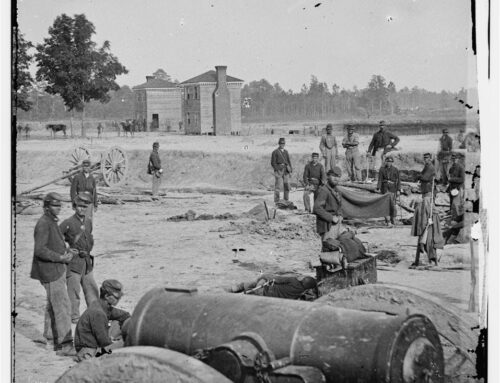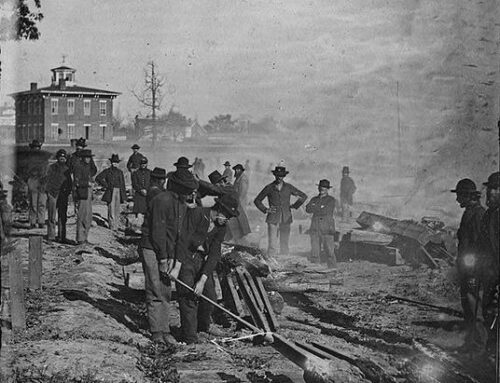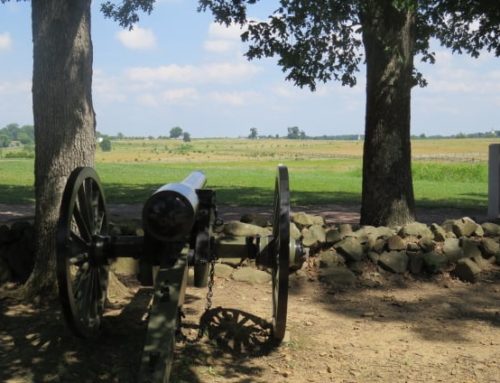The American Civil War was a conflict that tore the nation apart and established a new era. It was marked by numerous significant events and battles. The Fall of Richmond, the Confederate States of America’s capital, was one of the most significant of these.
This pivotal moment in the war not only dealt the Confederate cause a fatal blow but also set the stage for the eventual reunification of the nation. The circumstances leading up to Richmond’s fall, how it affected the American Civil War, and how it left a lasting mark on American history will all be discussed in this article.
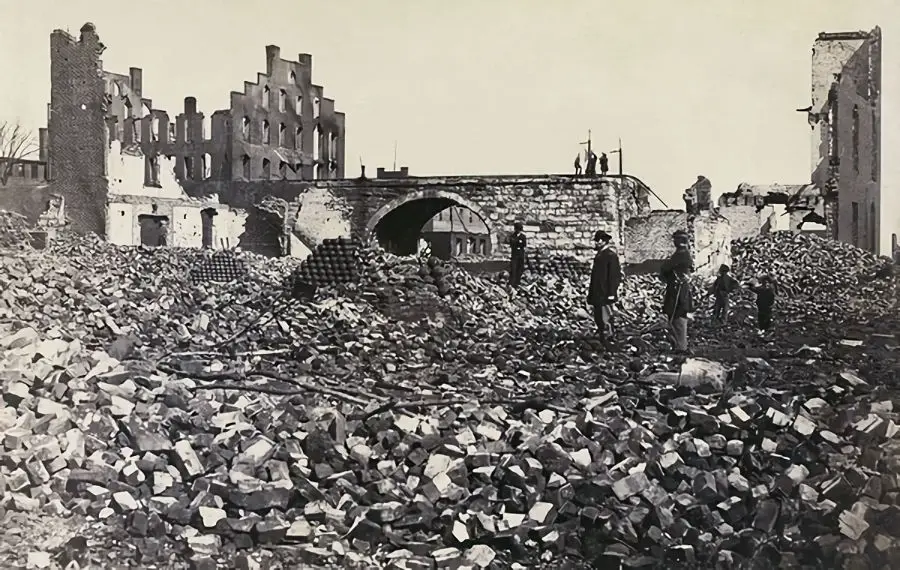
Richmond-Virginia after surrender during the Civil War – 1865
Richmond’s Importance A Confederate Stronghold
For the Confederacy, Richmond was of utmost strategic and symbolic importance. It served as the secessionist states’ administrative and political capital. The Tredegar Iron Works, one of the most significant iron foundries in the South, and a network of railroads that facilitated the movement of troops and supplies further contributed to Richmond’s status as a center of industry and transportation.
Prelude to the Fall: The Siege of Petersburg
The Siege of Petersburg, a grueling, ten-month battle that took place from June 1864 to March 1865, was inextricably linked to the fall of Richmond. In an effort to cut off Confederate supply routes and force the surrender of the Confederate capital, Union General Ulysses S. Grant laid siege to Richmond and Petersburg.
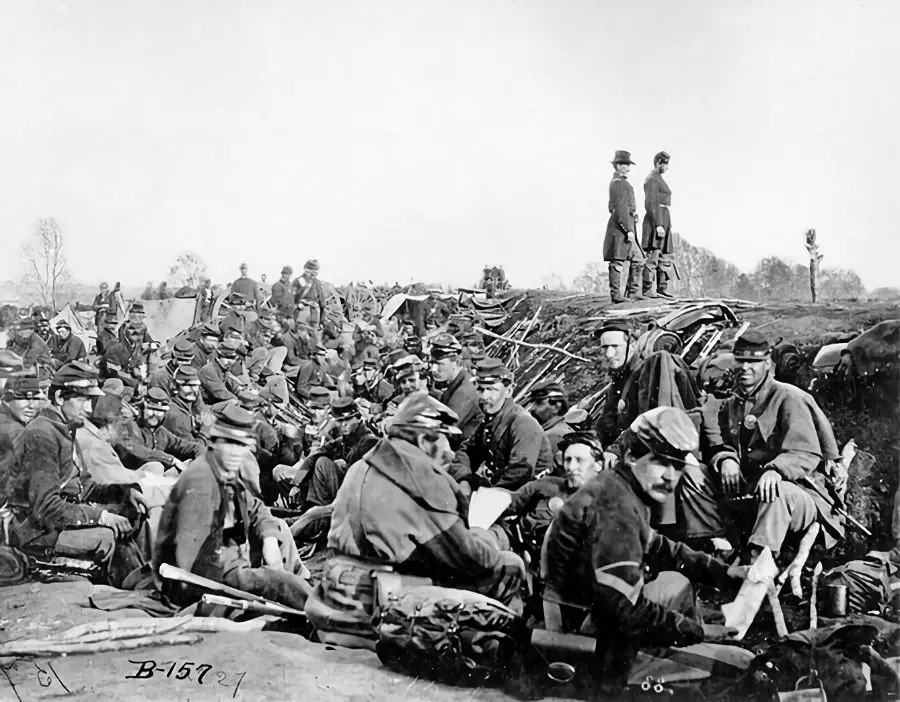
Union soldiers during the siege of Petersburg, Virginia
Despite the Confederates’ valiant defense, their supplies and morale dwindled over the course of the siege. General Robert E. Lee was forced to abandon Petersburg and retreat westward after a series of Union offensives, including the Battle of Five Forks on April 1, 1865, finally breached the Confederate defenses.
A City in Flames: The Fall of Richmond
The fall of Richmond was inevitable as the Confederate Army withdrew and Petersburg was no longer able to be defended. On April 2, 1865, Confederate President Jefferson Davis and his cabinet fled the city, leaving it at the mercy of the advancing Union forces.
As the Confederate government and Confederate military began to retreat looting and panic broke out in the city. This was made worse when retreating Confederate soldiers began setting fire to important military facilities, warehouses, and bridges to deprive the Union from using them. Unfortunately, these fires quickly spread and consumed large parts of the city. The Tredegar Iron Works went up in flames causing ammunition that was stored there to begin to explode.
Around this time the people of Richmond heard huge explosions as the Confederate military set fire to two ironclad warships in the James River to prevent their capture. The fire ignited ammunition stored on the ships causing large and violent explosions.
Richmond’s fate was effectively sealed on April 3 when Union troops under Major General Godfrey Weitzel entered the city. Union officials began extinguishing the fires and distributing food and other supplies, quickly bringing order to the chaotic situation.
A Nation Nearing Reunification: The Aftermath
A significant turning point in the American Civil War was the fall of Richmond. It shattered Confederate morale and foreshadowed the conflict’s approaching end. A week later, on April 9, 1865, General Lee surrendered to General Grant at Appomattox Court House, effectively putting an end to the war.
The end of the Civil War and the destruction of Richmond marked the beginning of the Reconstruction Era, a turbulent time when the United States struggled to mend a divided nation and deal with the social and economic repercussions of slavery and war.
Conclusion: Richmond’s Fall: Its Long-Term Effects
The Fall of Richmond was a turning point in the American Civil War, indicating the impending defeat of the Confederate cause and setting the stage for the country’s reunification.
The city faced the enormous task of rebuilding and recovering from the destruction in the aftermath of the Civil War and Richmond’s fall. But Richmond’s ability to bounce back was a testament to the city’s residents’ tenacity and resolve as a nation. The city gradually rebuilt its infrastructure and reestablished itself as a significant economic hub in the South.
The fall of Richmond and the end of the American Civil War also marked the beginning of significant social and political changes in the country. The 13th, 14th, and 15th Amendments to the Constitution, which were adopted during the Reconstruction Era (1865–1877), put an end to slavery, gave citizenship to everyone born or naturalized in the country (including former slaves), and guaranteed the right to vote for everyone, regardless of race or color.
Fall of Richmond – FAQs
In the Fall of Richmond, What Role Did Naval Forces Play?
Naval forces played a significant role throughout the Civil War, even though the fall of Richmond was primarily a land-based operation. The Anaconda Plan, the Union’s naval blockade of the Confederacy, restricted the South’s access to trade and foreign supplies. Confederate logistics and communication were further hampered by Union riverine forces’ controlling important waterways.
What Effects Did Richmond’s Fall Have on the City’s Civilian Population?
The fall of Richmond caused hardships for its civilian population. The fires that ravaged the city caused many residents to lose their homes and possessions. Union forces helped in the immediate aftermath by distributing food and other supplies, but the recovery process was drawn out and difficult. The city was eventually revitalized as a result of reconstruction efforts.
During the Siege of Petersburg and the Fall of Richmond, Who Was in Command of Confederate forces?
During the Siege of Petersburg and the subsequent fall of Richmond, General Robert E. Lee, one of the Confederacy’s most renowned military leaders, was in command of the Army of Northern Virginia.
During the Civil War, Did Any Other Confederate Cities Suffer a Similar Fate?
While the fall of Richmond was a significant event, other Confederate cities also experienced siege and occupation by Union forces. Vicksburg, Mississippi, which fell after a 47-day siege in 1863, and Atlanta, Georgia, which was captured by Union forces in 1864 and later burned by General William Tecumseh Sherman during his March to the Sea, are two notable examples.
In the Fall of Richmond, What Role Did African American Soldiers Play?
African American soldiers played a critical role in the Union’s Civil War victory, including the fall of Richmond. The Union Army had about 180,000 African American soldiers. The 25th Army Corps, which was mainly composed of African American soldiers, was one of the first Union forces to enter the city after Richmond’s fall.



